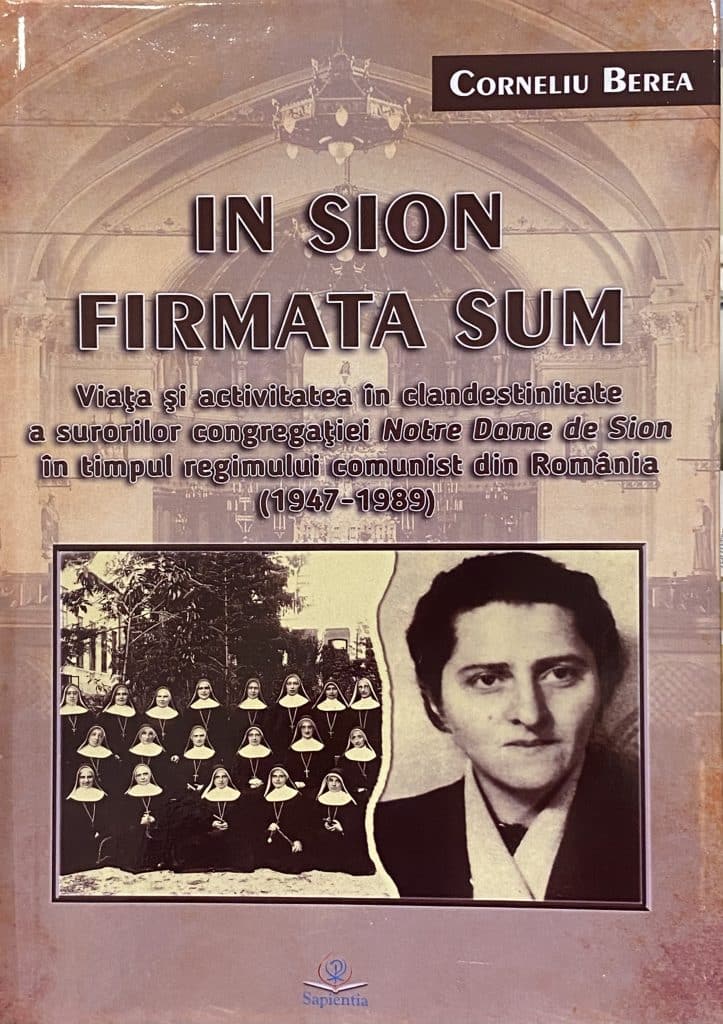


Their schools and convents were confiscated. Many were dispersed, some were imprisoned. All were silenced, yet their trust in God endured, quietly.
 That story, held under the veil of modesty for decades, is now told in In Sion Firmata Sum. Viața și activitatea în clandestinitate a surorilor Congregației Notre Dame de Sion în timpul regimului comunist din România (1947–1989) (The life and clandestine activities of the sisters of the Congregation of Notre Dame de Sion during the communist regime in Romania (1947-1989)), written by Fr Corneliu Berea.
That story, held under the veil of modesty for decades, is now told in In Sion Firmata Sum. Viața și activitatea în clandestinitate a surorilor Congregației Notre Dame de Sion în timpul regimului comunist din România (1947–1989) (The life and clandestine activities of the sisters of the Congregation of Notre Dame de Sion during the communist regime in Romania (1947-1989)), written by Fr Corneliu Berea.
Six chapters chart successive periods, each set within its political context, to make a complex history clear and accessible. Drawing on letters and other archival material, the book traces the sisters’ spiritual and practical resilience through years of secrecy and persecution.
The project was initiated by Sr Iuliana Neculai NDS, who felt an urgent need to preserve the memory of those who had lived their vocation in silence. “Thirty-five years since 1989,” she says, “we are again at a moment of transition, because the generation that lived through those years has quietly passed away.”
The Congregation of Notre Dame de Sion first arrived in Romania in 1866, establishing schools in Iași, Galați, București and Oradea. Rooted in the vision of founder Fr Théodore Ratisbonne, these were vibrant centres of education for girls from diverse social and religious backgrounds.
During both world wars the sisters adapted. They turned their schools into field hospitals and cared for the wounded, showing a resilience that foreshadowed what was to come.
Under communism, community life was dismantled and the sisters effectively became homeless and jobless. Some took shelter with families or found modest work. Some were arrested. Still, they continued their apostolate in secret where they could, holding fast to their vocation as to a precious treasure.
Sr Iuliana recalls meeting some of the nearly one hundred sisters who endured that clandestine period. For her, the years of hiding evoke a biblical image. “The sisters described that time as a wilderness, a place of testing and transformation. It was harsh, but their bond with God grew stronger there.”
“Their courage was quiet but steadfast,” she says. “They passed away quietly, one by one, sustained by the same faith that had given them the strength to confess Christ in the face of persecution.”

The sisters found ways of having letters smuggled out of the country, to let the Congregation know of important news, such as deaths and secret vows.
During the communist decades, communication with the Congregation abroad was forbidden. After 1989, when the walls fell, the reunion was both joyful and complex. “We were discovering one another anew,” Sr Iuliana recalls. “Remembering that time helps us reconcile with the past and see it in the light of God.”
The Congregation of Our Lady of Sion is deeply grateful to Fr Corneliu for the testimony he has crafted with such care and respect. “Through his patience, dedication, and passion,” says Sr Iuliana, “He has given us not only a historical record but a story that speaks to the heart.”
Indeed, the book, which concludes with biographical notes on every single sister who lived through those years, is more than a chronicle of suffering; it is a celebration of spiritual resistance and an act of remembrance. It reminds readers that the faith lived today in the Romanian Church is built on the hidden labour of those who came before: bishops, priests, consecrated people, and countless lay people who kept the flame alive in dark times.
It’s a universal message: freedom of belief is not to be taken for granted. As Sr Iuliana reflects, “The freedom we enjoy today is a precious gift, but it also carries the responsibility to live that freedom consciously, with gratitude and commitment.”
The main picture at the top of the page shows the Notre Dame de Sion Galatz community in 1942 (left photo), and the sisters during communism, having shed external signs of religious life and living in poverty (right photo).
In Sion Firmata Sum is available online in Romanian through Librăria Sapientia. You can also read the book’s Foreword on the Editura Sapientia website.
The release date of the English edition will be announced in due course and, due to the volume of research unearthed, a second book is planned.